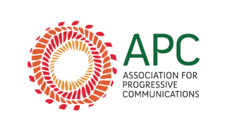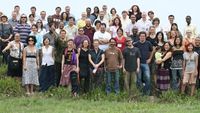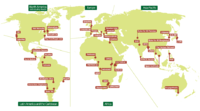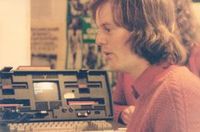Difference between revisions of "Association for Progressive Communications"
Dustin Loup (talk | contribs) |
|||
| (20 intermediate revisions by 3 users not shown) | |||
| Line 1: | Line 1: | ||
| − | {{ | + | {{Actor |
| − | | | + | |stakeholder group=Civil Society |
| − | | type | + | |country=South Africa |
| − | | industry | + | |region=Global |
| − | + | |website=http://www.apc.org/en/ | |
| − | | email | + | |issue areas=Access, Human Rights, Gender Equality |
| − | + | |Logo=Apc-Logo.png | |
| − | | blog | + | |type=Nonprofit organization |
| − | | twitter | + | |industry=[[Internet Governance]] |
| + | |email=info [at] apc.org | ||
| + | |blog=[http://www.apc.org/en/blog APC blog] | ||
| + | |twitter=APC_news | ||
}} | }} | ||
| − | + | The '''Association for Progressive Communications''' (APC) is a nonprofit organisation that aims to make internet access more widely available and to work for a free and open internet.<ref>[http://www.apc.org/en/about APC about] Retrieved 12/21/14.</ref> | |
| − | The '''Association for Progressive Communications''' (APC) is a nonprofit | ||
==About APC== | ==About APC== | ||
| − | APC’s strength lies in the fact that we don’t get excited about the internet for the internet’s sake. We are committed activists who want to use it to make the world a better place. We help people get access to the internet where there is none or it is unaffordable, we help grassroots groups use the technology to develop their communities and further their rights, and we work to make sure that government policies related to information and communication serve the best interests of the general population, especially people living in developing countries. | + | From its website: "APC’s strength lies in the fact that we don’t get excited about the internet for the internet’s sake. We are committed activists who want to use it to make the world a better place. We help people get access to the internet where there is none or it is unaffordable, we help grassroots groups use the technology to develop their communities and further their rights, and we work to make sure that government policies related to information and communication serve the best interests of the general population, especially people living in developing countries. |
'''The APC vision''' | '''The APC vision''' | ||
| − | ''All people have easy and affordable access to a free and open internet to improve their lives and create a more just world.'' | + | [[File:RioMeeting closeup.large feature.jpg|200px|thumb|right|APC staff and members]]''All people have easy and affordable access to a free and open internet to improve their lives and create a more just world.'' |
'''The APC mission''' | '''The APC mission''' | ||
| Line 24: | Line 26: | ||
''APC’s mission is to empower and support organisations, social movements and individuals in and through the use of information and communication technologies (ICTs) to build strategic communities and initiatives for the purpose of making meaningful contributions to equitable human development, social justice, participatory political processes and environmental sustainability.'' | ''APC’s mission is to empower and support organisations, social movements and individuals in and through the use of information and communication technologies (ICTs) to build strategic communities and initiatives for the purpose of making meaningful contributions to equitable human development, social justice, participatory political processes and environmental sustainability.'' | ||
| − | + | ==A network and an organisation== | |
| − | APC is both a network and an organisation. [https://www.apc.org/en/members/ APC members] are groups working in their own countries to advance the same mission as APC. The membership | + | [[File:APC-members-by-region 2015 1.png|200px|thumb|right]] |
| + | APC is both a network and an organisation. [https://www.apc.org/en/members/ APC members] are groups working in their own countries to advance the same mission as APC. The membership defines APC’s strategic priorities every five years. APC has a small staff, each living in different countries and communicating day-to-day over the internet. APC’s value and uniqueness come from the local perspectives and contact with grassroots organisations that we gain from our members and the fact that we operate as a truly virtual, international organisation. | ||
| − | ''' | + | '''Organizational Aims and Practices''' |
| − | + | APC organises its work into three programme areas: | |
[https://www.apc.org/en/node/2692/ Communications and information policy] | [https://www.apc.org/en/node/2692/ Communications and information policy] | ||
| + | |||
[https://www.apc.org/en/node/1805/ Women’s rights] | [https://www.apc.org/en/node/1805/ Women’s rights] | ||
| + | |||
[https://www.apc.org/en/node/1804/ Strategic use of technology and capacity building] | [https://www.apc.org/en/node/1804/ Strategic use of technology and capacity building] | ||
| − | + | APC's strongest activities are often those taking place at the local or national level where the real impact can be felt, and from which the network can learn and replicate regionally or internationally. They work as a network – i.e., programmes and members work together to conceptualise projects and campaigns and then implement them together. | |
| − | + | ==Strategic priorities for 2013-2016== | |
| − | Established by | + | Established by international membership, APC the worldwide network has committed to: |
* [https://www.apc.org/en/about/strategic-priorities-2013-16#1 Securing and defending internet access and rights] | * [https://www.apc.org/en/about/strategic-priorities-2013-16#1 Securing and defending internet access and rights] | ||
| Line 48: | Line 53: | ||
* [https://www.apc.org/en/about/strategic-priorities-2013-16#5 Strengthening APC community networks] | * [https://www.apc.org/en/about/strategic-priorities-2013-16#5 Strengthening APC community networks] | ||
| − | Find out more about the [https://www.apc.org/en/about/strategic-priorities-2013-16 strategic priorities]. | + | ''Find out more about the [https://www.apc.org/en/about/strategic-priorities-2013-16 strategic priorities].'' |
| + | |||
| + | ==Projects== | ||
| + | |||
| + | APC helps people get access to the internet where there is none or it is unaffordable, they help grassroots groups use the technology to develop their communities and further their rights, and they work to make sure that government policies related to information and communication serve the best interests of the general population, especially people living in developing countries. In all of their work, the organisation encourages people to network as a means of making other activities more sustainable. The organisation believes that if people share their experiences and skills they have greater value over a longer period and often create a ripple effect. | ||
| + | |||
| + | ''[http://www.apc.org/en/projects Here are our current projects.]'' | ||
| − | |||
| − | + | '''Current topics''' | |
| − | + | * Access to information: Open access, accessibility, censorship and circumvention. | |
| + | |||
| + | * Access to the internet: internet infrastructure, wireless technology. | ||
| + | |||
| + | * Economic, social and cultural rights in the digital age, also cultural and linguistic diversity. | ||
| + | |||
| + | * Environment and ICTs: Environmental sustainability of ICTs infrastructure and hardware, impacts of ICTs on the environment, ICTs solutions to | ||
| + | * environmental sustainability | ||
| + | |||
| + | * Free/libre and open source software | ||
| + | |||
| + | * Freedom of expression: How FX online and offline is impacted by the internet | ||
| + | |||
| + | * Gender and ICTs including sexual rights | ||
| + | |||
| + | * ICT for development | ||
| + | |||
| + | * ICT policy including internet governance | ||
| + | |||
| + | * Cybersecurity | ||
| + | |||
| + | * Surveillance, right to privacy | ||
| + | |||
| + | * Freedom of association (offline and online) in the digital age and anonymity | ||
==History== | ==History== | ||
Between 1982 and 1987 several independent, national, non-profit computer networks emerged as viable information and communication resources for activists and NGOs. The networks were founded by people with experience in communication and international collaboration in the NGO world, and a deep commitment to making new communication techniques available to movements working for social change. Most networks were founded by a small number of people who devoted their personal equipment and all their free time to spread electronic communication to their colleagues working for change. | Between 1982 and 1987 several independent, national, non-profit computer networks emerged as viable information and communication resources for activists and NGOs. The networks were founded by people with experience in communication and international collaboration in the NGO world, and a deep commitment to making new communication techniques available to movements working for social change. Most networks were founded by a small number of people who devoted their personal equipment and all their free time to spread electronic communication to their colleagues working for change. | ||
| − | + | [[File:GNMitraOsborneComputer1987.feature.jpg|200px|thumb|right|Mitra Ardron of GreenNet in 1987]] | |
In 1987, people at GreenNet in the UK, began collaborating with their counterparts at the Institute for Global Communications (IGC) (then known as PeaceNet/EcoNet) in the United States. These two networks started sharing electronic conference material and demonstrated that trans-national electronic communications could serve international as well as domestic communities working for peace, human rights and the environment. The basis for an APC constitution was outlined at a meeting in IGC’s office in San Francisco. | In 1987, people at GreenNet in the UK, began collaborating with their counterparts at the Institute for Global Communications (IGC) (then known as PeaceNet/EcoNet) in the United States. These two networks started sharing electronic conference material and demonstrated that trans-national electronic communications could serve international as well as domestic communities working for peace, human rights and the environment. The basis for an APC constitution was outlined at a meeting in IGC’s office in San Francisco. | ||
| Line 66: | Line 99: | ||
In June 1995, APC received consultative (Category 1) status to the UN. | In June 1995, APC received consultative (Category 1) status to the UN. | ||
| − | + | '''Legal status''' | |
| − | APC | + | APC was founded in 1990, and operated legally as a partner of the Tides Foundation until 1998, when they were incorporated as a nonprofit under section 501( c ) (3), public charity status 170 (b) (1) (A) (vi) state of California, USA. APC is governed according to the nonprofit regulations of the State of California, even though we are an international network. |
| − | + | The organization has consultative status to the United Nations. They are an active participant in high-level international ICT policy discussions and were granted category one consultative status to the United Nations Economic and Social Council (ECOSOC) in 1995. | |
==References== | ==References== | ||
Latest revision as of 15:14, 17 October 2017
| General Information | |
|---|---|
| Industry: | Internet Governance |
| Stakeholder Group: | Civil Society |
| Issue Areas: | Access, Human Rights, Gender Equality |
| Country: | South Africa |
| Region: | Global |
| Website: | |
| Blog: | APC blog |
| Contact | |
|---|---|
| Email: | info [at] apc.org |
| Twitter: | |
| People |
|---|
The Association for Progressive Communications (APC) is a nonprofit organisation that aims to make internet access more widely available and to work for a free and open internet.[1]
About APC
From its website: "APC’s strength lies in the fact that we don’t get excited about the internet for the internet’s sake. We are committed activists who want to use it to make the world a better place. We help people get access to the internet where there is none or it is unaffordable, we help grassroots groups use the technology to develop their communities and further their rights, and we work to make sure that government policies related to information and communication serve the best interests of the general population, especially people living in developing countries.
The APC vision
All people have easy and affordable access to a free and open internet to improve their lives and create a more just world.
The APC mission
APC’s mission is to empower and support organisations, social movements and individuals in and through the use of information and communication technologies (ICTs) to build strategic communities and initiatives for the purpose of making meaningful contributions to equitable human development, social justice, participatory political processes and environmental sustainability.
A network and an organisation
APC is both a network and an organisation. APC members are groups working in their own countries to advance the same mission as APC. The membership defines APC’s strategic priorities every five years. APC has a small staff, each living in different countries and communicating day-to-day over the internet. APC’s value and uniqueness come from the local perspectives and contact with grassroots organisations that we gain from our members and the fact that we operate as a truly virtual, international organisation.
Organizational Aims and Practices
APC organises its work into three programme areas:
Communications and information policy
Strategic use of technology and capacity building
APC's strongest activities are often those taking place at the local or national level where the real impact can be felt, and from which the network can learn and replicate regionally or internationally. They work as a network – i.e., programmes and members work together to conceptualise projects and campaigns and then implement them together.
Strategic priorities for 2013-2016
Established by international membership, APC the worldwide network has committed to:
- Securing and defending internet access and rights
- Fostering good internet governance
- Strengthening use and development of transformative technology
- Ending technology-based violence against women and girls
- Strengthening APC community networks
Find out more about the strategic priorities.
Projects
APC helps people get access to the internet where there is none or it is unaffordable, they help grassroots groups use the technology to develop their communities and further their rights, and they work to make sure that government policies related to information and communication serve the best interests of the general population, especially people living in developing countries. In all of their work, the organisation encourages people to network as a means of making other activities more sustainable. The organisation believes that if people share their experiences and skills they have greater value over a longer period and often create a ripple effect.
Here are our current projects.
Current topics
- Access to information: Open access, accessibility, censorship and circumvention.
- Access to the internet: internet infrastructure, wireless technology.
- Economic, social and cultural rights in the digital age, also cultural and linguistic diversity.
- Environment and ICTs: Environmental sustainability of ICTs infrastructure and hardware, impacts of ICTs on the environment, ICTs solutions to
- environmental sustainability
- Free/libre and open source software
- Freedom of expression: How FX online and offline is impacted by the internet
- Gender and ICTs including sexual rights
- ICT for development
- ICT policy including internet governance
- Cybersecurity
- Surveillance, right to privacy
- Freedom of association (offline and online) in the digital age and anonymity
History
Between 1982 and 1987 several independent, national, non-profit computer networks emerged as viable information and communication resources for activists and NGOs. The networks were founded by people with experience in communication and international collaboration in the NGO world, and a deep commitment to making new communication techniques available to movements working for social change. Most networks were founded by a small number of people who devoted their personal equipment and all their free time to spread electronic communication to their colleagues working for change.
In 1987, people at GreenNet in the UK, began collaborating with their counterparts at the Institute for Global Communications (IGC) (then known as PeaceNet/EcoNet) in the United States. These two networks started sharing electronic conference material and demonstrated that trans-national electronic communications could serve international as well as domestic communities working for peace, human rights and the environment. The basis for an APC constitution was outlined at a meeting in IGC’s office in San Francisco.
This innovation proved so successful that by late 1989, networks in Sweden (NordNet), Canada (Web), Brazil (IBASE), Nicaragua (Nicarao) and Australia (Pegasus) were exchanging information with each other and with IGC and GreenNet. In May 1990, these seven organisations founded the Association for Progressive Communications (APC) to co-ordinate the operation and development of this emerging global network of networks.
In June 1995, APC received consultative (Category 1) status to the UN.
Legal status
APC was founded in 1990, and operated legally as a partner of the Tides Foundation until 1998, when they were incorporated as a nonprofit under section 501( c ) (3), public charity status 170 (b) (1) (A) (vi) state of California, USA. APC is governed according to the nonprofit regulations of the State of California, even though we are an international network.
The organization has consultative status to the United Nations. They are an active participant in high-level international ICT policy discussions and were granted category one consultative status to the United Nations Economic and Social Council (ECOSOC) in 1995.



